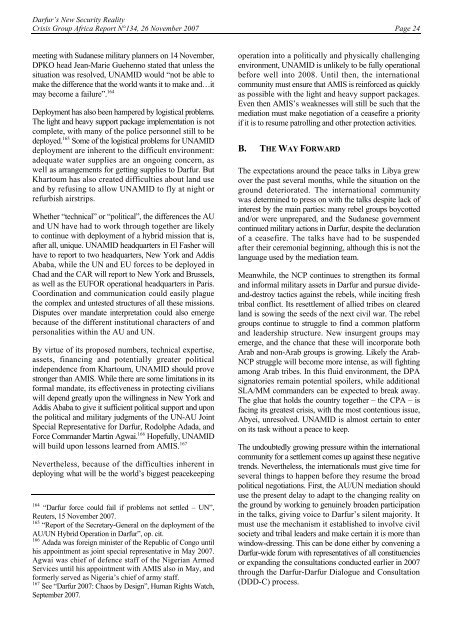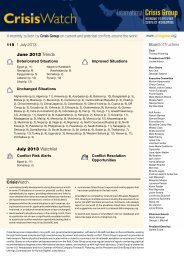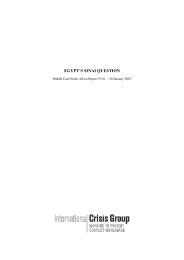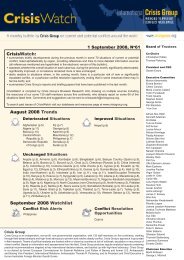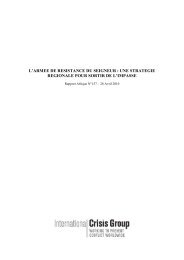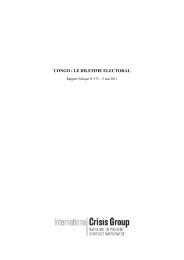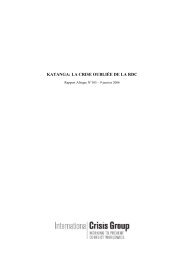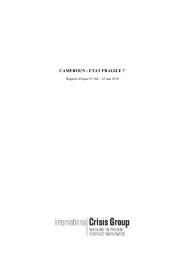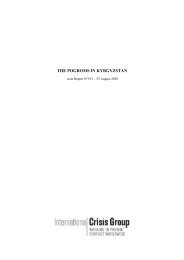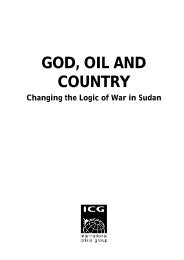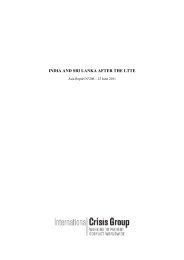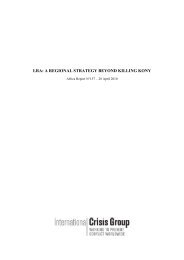sudan - International Crisis Group
sudan - International Crisis Group
sudan - International Crisis Group
Create successful ePaper yourself
Turn your PDF publications into a flip-book with our unique Google optimized e-Paper software.
Darfur’s New Security Reality<br />
<strong>Crisis</strong> <strong>Group</strong> Africa Report N°134, 26 November 2007 Page 24<br />
meeting with Sudanese military planners on 14 November,<br />
DPKO head Jean-Marie Guehenno stated that unless the<br />
situation was resolved, UNAMID would “not be able to<br />
make the difference that the world wants it to make and…it<br />
may become a failure”. 164<br />
Deployment has also been hampered by logistical problems.<br />
The light and heavy support package implementation is not<br />
complete, with many of the police personnel still to be<br />
deployed. 165 Some of the logistical problems for UNAMID<br />
deployment are inherent to the difficult environment:<br />
adequate water supplies are an ongoing concern, as<br />
well as arrangements for getting supplies to Darfur. But<br />
Khartoum has also created difficulties about land use<br />
and by refusing to allow UNAMID to fly at night or<br />
refurbish airstrips.<br />
Whether “technical” or “political”, the differences the AU<br />
and UN have had to work through together are likely<br />
to continue with deployment of a hybrid mission that is,<br />
after all, unique. UNAMID headquarters in El Fasher will<br />
have to report to two headquarters, New York and Addis<br />
Ababa, while the UN and EU forces to be deployed in<br />
Chad and the CAR will report to New York and Brussels,<br />
as well as the EUFOR operational headquarters in Paris.<br />
Coordination and communication could easily plague<br />
the complex and untested structures of all these missions.<br />
Disputes over mandate interpretation could also emerge<br />
because of the different institutional characters of and<br />
personalities within the AU and UN.<br />
By virtue of its proposed numbers, technical expertise,<br />
assets, financing and potentially greater political<br />
independence from Khartoum, UNAMID should prove<br />
stronger than AMIS. While there are some limitations in its<br />
formal mandate, its effectiveness in protecting civilians<br />
will depend greatly upon the willingness in New York and<br />
Addis Ababa to give it sufficient political support and upon<br />
the political and military judgments of the UN-AU Joint<br />
Special Representative for Darfur, Rodolphe Adada, and<br />
Force Commander Martin Agwai. 166 Hopefully, UNAMID<br />
will build upon lessons learned from AMIS. 167<br />
Nevertheless, because of the difficulties inherent in<br />
deploying what will be the world’s biggest peacekeeping<br />
164 “Darfur force could fail if problems not settled – UN”,<br />
Reuters, 15 November 2007.<br />
165 “Report of the Secretary-General on the deployment of the<br />
AU/UN Hybrid Operation in Darfur”, op. cit.<br />
166 Adada was foreign minister of the Republic of Congo until<br />
his appointment as joint special representative in May 2007.<br />
Agwai was chief of defence staff of the Nigerian Armed<br />
Services until his appointment with AMIS also in May, and<br />
formerly served as Nigeria’s chief of army staff.<br />
167 See “Darfur 2007: Chaos by Design”, Human Rights Watch,<br />
September 2007.<br />
operation into a politically and physically challenging<br />
environment, UNAMID is unlikely to be fully operational<br />
before well into 2008. Until then, the international<br />
community must ensure that AMIS is reinforced as quickly<br />
as possible with the light and heavy support packages.<br />
Even then AMIS’s weaknesses will still be such that the<br />
mediation must make negotiation of a ceasefire a priority<br />
if it is to resume patrolling and other protection activities.<br />
B. THE WAY FORWARD<br />
The expectations around the peace talks in Libya grew<br />
over the past several months, while the situation on the<br />
ground deteriorated. The international community<br />
was determined to press on with the talks despite lack of<br />
interest by the main parties: many rebel groups boycotted<br />
and/or were unprepared, and the Sudanese government<br />
continued military actions in Darfur, despite the declaration<br />
of a ceasefire. The talks have had to be suspended<br />
after their ceremonial beginning, although this is not the<br />
language used by the mediation team.<br />
Meanwhile, the NCP continues to strengthen its formal<br />
and informal military assets in Darfur and pursue divideand-destroy<br />
tactics against the rebels, while inciting fresh<br />
tribal conflict. Its resettlement of allied tribes on cleared<br />
land is sowing the seeds of the next civil war. The rebel<br />
groups continue to struggle to find a common platform<br />
and leadership structure. New insurgent groups may<br />
emerge, and the chance that these will incorporate both<br />
Arab and non-Arab groups is growing. Likely the Arab-<br />
NCP struggle will become more intense, as will fighting<br />
among Arab tribes. In this fluid environment, the DPA<br />
signatories remain potential spoilers, while additional<br />
SLA/MM commanders can be expected to break away.<br />
The glue that holds the country together – the CPA – is<br />
facing its greatest crisis, with the most contentious issue,<br />
Abyei, unresolved. UNAMID is almost certain to enter<br />
on its task without a peace to keep.<br />
The undoubtedly growing pressure within the international<br />
community for a settlement comes up against these negative<br />
trends. Nevertheless, the internationals must give time for<br />
several things to happen before they resume the broad<br />
political negotiations. First, the AU/UN mediation should<br />
use the present delay to adapt to the changing reality on<br />
the ground by working to genuinely broaden participation<br />
in the talks, giving voice to Darfur’s silent majority. It<br />
must use the mechanism it established to involve civil<br />
society and tribal leaders and make certain it is more than<br />
window-dressing. This can be done either by convening a<br />
Darfur-wide forum with representatives of all constituencies<br />
or expanding the consultations conducted earlier in 2007<br />
through the Darfur-Darfur Dialogue and Consultation<br />
(DDD-C) process.


